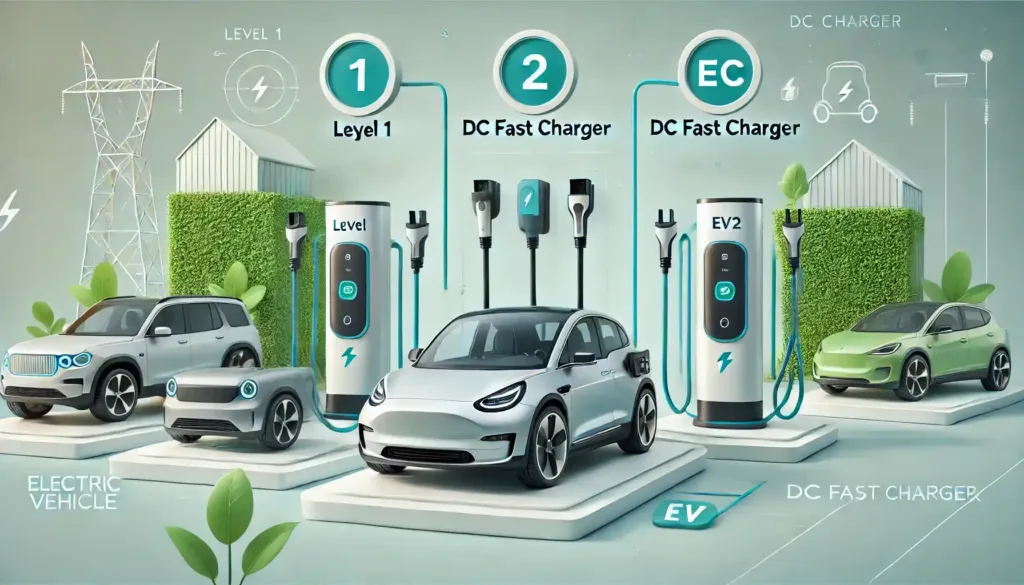No products in the cart.
As an electric vehicle (EV) owner, having the right charger is essential for ensuring a smooth and convenient charging experience. With various types and levels of chargers available, choosing the best option for your needs can feel overwhelming. In this post, we’ll break down the key factors to consider when selecting an EV charger, so you can make an informed choice and keep your EV powered up efficiently.
Understanding EV Charger Types

There are three main types of EV chargers: Level 1, Level 2, and DC Fast Chargers (Level 3). Each type differs in terms of charging speed, power output, and cost. Here’s a quick overview:
Level 1 Charger:
These chargers use a standard 120-volt outlet, typically included with your EV. They’re best for drivers who only need to top up their charge overnight or who don’t travel long distances regularly. However, they’re the slowest option, providing around 3–5 miles of range per hour.Level 2 Charger:
Using a 240-volt outlet, Level 2 chargers are ideal for home installations and can charge an EV much faster than Level 1. On average, they add about 25–30 miles of range per hour, making them perfect for daily charging needs. They’re often found in public locations like parking lots and shopping centers.DC Fast Charger (Level 3):
DC Fast Chargers deliver the fastest charging speeds, capable of charging an EV up to 80% in 20–30 minutes. They are typically found in commercial and public spaces, making them convenient for quick top-ups on the go. However, they’re much pricier and usually not feasible for home use.
Key Considerations for Choosing an EV Charger
Selecting the right EV charger involves understanding your specific needs and how you plan to use your EV. Here are some critical factors to consider:
1. Charging Speed Requirements
Your choice of charger largely depends on how quickly you need your EV charged. If you primarily charge your vehicle overnight, a Level 1 or Level 2 charger may suffice. However, if you frequently need quick top-ups, look for a high-speed Level 2 charger or consider using DC Fast Chargers at public locations.
2. Home Installation Compatibility
Before purchasing a charger, assess your home’s electrical setup. Level 1 chargers use a standard outlet, but Level 2 chargers require a 240-volt outlet, which may need professional installation. It’s wise to consult an electrician to ensure your home’s electrical system can support a Level 2 charger safely.
3. Portability vs. Fixed Installation
Some EV owners prefer portable chargers, which can be plugged into any compatible outlet and moved as needed. These are ideal if you want flexibility, such as taking your charger with you on trips. On the other hand, fixed wall-mounted chargers offer convenience and can provide faster charging speeds, making them a great choice for home use.
4. Smart Charging Features
Modern EV chargers often come with smart features, like Wi-Fi connectivity, which allows you to monitor and control your charging remotely via a smartphone app. Features such as scheduled charging (to take advantage of off-peak electricity rates) and energy tracking can make charging more efficient and cost-effective.
5. Budget and Long-Term Savings
While Level 1 chargers are the most affordable, investing in a Level 2 charger can save you money in the long run by reducing charging times and offering additional features. It’s essential to balance your budget with the convenience and efficiency you need.
Final Thoughts
Choosing the best EV charger is about understanding your daily charging needs, home compatibility, and desired features. Whether you’re looking for a simple, affordable option or a high-speed, smart-charging solution, the right charger can make a world of difference in your EV experience. Taking the time to choose wisely will ensure you get the most convenience and efficiency from your electric vehicle.








Add comment